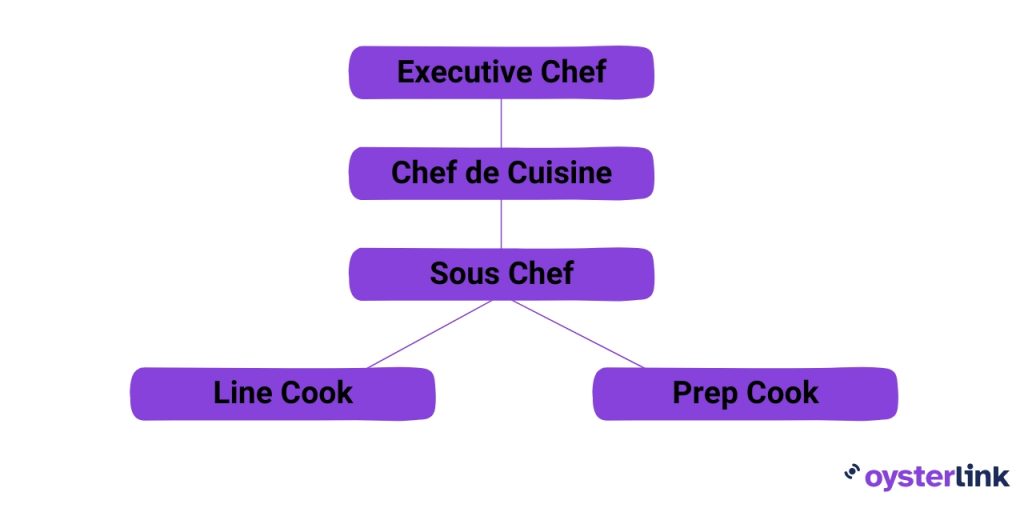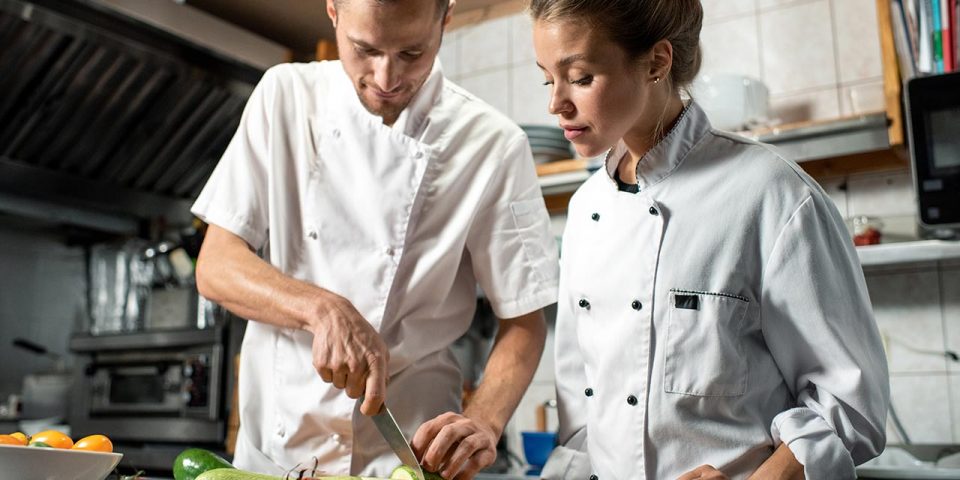Executive Chef and Chef de Cuisine are kitchen leadership roles that are often used interchangeably.
While they both require similar skills, knowledge and experience, their scale of responsibilities and position in the kitchen hierarchy is different.
Executive Chefs typically oversee several restaurants or kitchens within a large corporation, whereas the Chef de Cuisine, the traditional French term for Head Chef, focuses on a single restaurant.
To provide a clear overview of the key differences between the two, we’ll discuss their duties and responsibilities, the establishments that hire them and the qualifications needed.
What is an Executive Chef?
An Executive Chef is responsible for the financial, operational and strategic aspects of a restaurant. This includes cost forecasting, establishing processes and developing menus that are aligned with the restaurant’s concept, target audience and the latest trends.
What is a Chef de Cuisine?
A Chef de Cuisine is in charge of hiring restaurant staff, maintaining food quality and improving customer satisfaction. Their main goal is to ensure smooth kitchen operations.
What Are the Key Differences Between an Executive Chef and a Chef de Cuisine?
The key differences between an Executive and a Chef de Cuisine lie in their list of duties, qualifications and salary.
Responsibilities
- Extent of menu planning: Both the Executive Chef and the Chef de Cuisine are involved in menu planning, but they consider different factors. For example, an Executive Chef needs to prioritize menu consistency across various restaurant branches. Meanwhile, a Chef de Cuisine focuses more on catering to the local customers’ preferences.
- Operational tasks: An Executive Chef’s tasks lean more toward establishing processes, shaping company culture and managing finances. Meanwhile, a Chef de Cuisine is more hands-on with day-to-day kitchen tasks, such as organizing staff schedules, negotiating with vendors and overseeing food preparation.
- Scope of responsibility: As mentioned earlier, an Executive Chef supervises many restaurants within one company. A Chef de Cuisine typically manages only one restaurant.
Qualifications
- Work experience: Chef de Cuisine employers in New York City require applicants to have at least two years of supervisory experience. Meanwhile, most establishments hiring Executive Chefs in New York City need applicants to have a minimum of five years of experience in a leadership position.
- Skills: An Executive Chef needs advanced skills in written communication, budgeting and brand management. A Chef de Cuisine, on the other hand, is generally focused on practical kitchen skills and people management abilities, such as operating equipment and using Chef knives, maintaining adherence to food safety and sanitation guidelines and evaluating and coaching the kitchen team.
- Culinary education: Executive Chefs are generally expected to have a culinary arts degree, specifically a bachelor’s degree. Chef de Cuisine employers prefer candidates with at least a culinary diploma.
Salary
Executive Chefs in the U.S. earn 9% more than Chef de Cuisines, with an average salary of $80,040 per year. Meanwhile, Chef de Cuisines receive $73,362 annually.
Salaries for both positions can vary according to location, type of establishment and culinary experience.
Establishments That Hire Executive Chef and Chef de Cuisine
Based on our Executive Chef job listings, establishments that typically hire Executive Chefs are international restaurant, retail and hospitality groups that have multiple locations. This includes renowned companies like Pyramid Global Hospitality and Hilton.
On the other hand, Chef de Cuisines are commonly in demand in boutique hotels and independent restaurants that are primarily based in the U.S.
The French Brigade System
It’s important to mention that some establishments hire a Chef de Cuisine, who may fulfill the role of an Executive Chef.
Only the largest establishments employ both an Executive Chef and a Chef de Cuisine.
The kitchen brigade system offers clarity regarding the kitchen structure.

Entry-level Cooks, such as Line Cooks and Prep Cooks, sit at the bottom of the hierarchy and report to the Sous Chef, also known as Deputy Chef.
The Sous Chef then reports to the Chef de Cuisine.
Finally, the Chef De Cuisine is overseen by the Executive Chef.
For a more in-depth understanding, you can check out our kitchen hierarchy article.
How To Become an Executive Chef
To become an Executive Chef, consider these steps:
- Work in an entry-level position: Working as a Dishwasher provides an overview of the kitchen environment. Use this opportunity to determine if the culinary industry is the right path for you.
- Enroll in courses that enhance your culinary and leadership skills: If you decide that a career in the culinary arts is for you, taking courses that equip you with core skills is helpful in developing your abilities.
- Participate in an apprenticeship program: Apprenticeship programs offered by culinary schools provide you with valuable work experience that can be used when applying for jobs. In addition, you’ll have a mentor who can refer you once you’re ready to apply for a job.
How To Become a Chef de Cuisine
The path to becoming a Chef de Cuisine involves the following steps:
- Gain certifications: Certifications offer tangible proof of your competency in the kitchen. They boost your credibility and signal to your employer that you’re committed to excellence.
- Obtain culinary training: While going to culinary school isn’t mandatory to work as a Chef, it can give you an edge over other applicants who may lack formal education.
- Gain experience as a manager: Managing a busy, high-pressure kitchen can be stressful. This is why employers value supervisory experience, which inspires and motivates the kitchen team.
Which Role Fits Your Career Path?
If you want to manage several establishments, handle administrative duties and engage closely with stakeholders, the Executive Chef role is for you.
If you prefer a more hands-on approach, building strong relationships with your kitchen staff and working in a single restaurant, then the Chef de Cuisine role is a better fit.
When choosing between the roles of Executive Chef and Chef de Cuisine, it’s important to assess your strengths, preferences and overall career goals.




